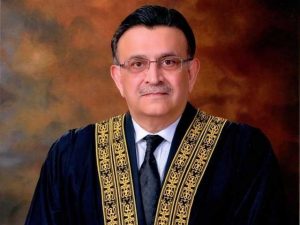CJP Umar Ata Bandial laments the lack of attention paid to the educational system in Sindh, which he calls “notorious for ghost schools.”

ISLAMABAD: Chief Justice Umar Ata Bandial lamented the sad situation of Sindh’s educational system on Friday, saying the region was infamous for its “ghost schools”—non-operational institutions that continue to exist only on paper.
Justice Ayesha Malik and Chief Justice Umar Atta Bandial presided over a two-judge panel that was hearing an appeal of the Sindh High Court’s (SHC) ruling regarding the forensic audit of the Sindh Textbook Board. The appeal was brought by the Sindh Textbook Board.
CJP Umar Ata Bandial stated at the hearing that the lack of attention given to the educational system was the largest shortcoming of the nation. He indicated to the government’s attorney for Sindh that the region had a bad reputation for its “ghost schools.”
Later, the highest court mandated that a forensic audit be performed on the Sindh Textbook Board and that the results be given to the appropriate court.
The Board’s attorney argued that the SHC had given an unlawful order.
Justice Malik commented that the SHC had ordered an audit of the board’s Rs2.3 billion budget, which the board was not carrying out.
The board did not object to the audit, but it did object to the hiring of a second registrar as a supervisor and starting the audit right once, the attorney said. The chief justice claimed that the lack of attention given to education was the nation’s weakness.
Regarding the auditing authority, he inquired. The attorney said that the Accountant General of Pakistan Revenues had done the audit (AGPR). If the court so directed, he said, he would submit the audit reports for the previous 20 years.
The Sindh Textbook Board will be audited, the court subsequently ordered.
It is important to know that according to a report that surfaced last year, there are up to 11,000 schools in Sindh with teachers but no students, and these teachers get paid fairly without performing any job.
The state’s meagre resources are being put to a strain by these schools. The staggering salary expenditure for paying instructors is made up of 11,000 teachers’ wages.
According to the report, because no students are attending these institutions, powerful people are using them as guest residences. In rural Sindh, there are 1.8 schools per 1,000 students. Only 15% of elementary and middle schools have two teachers, it continued.










































